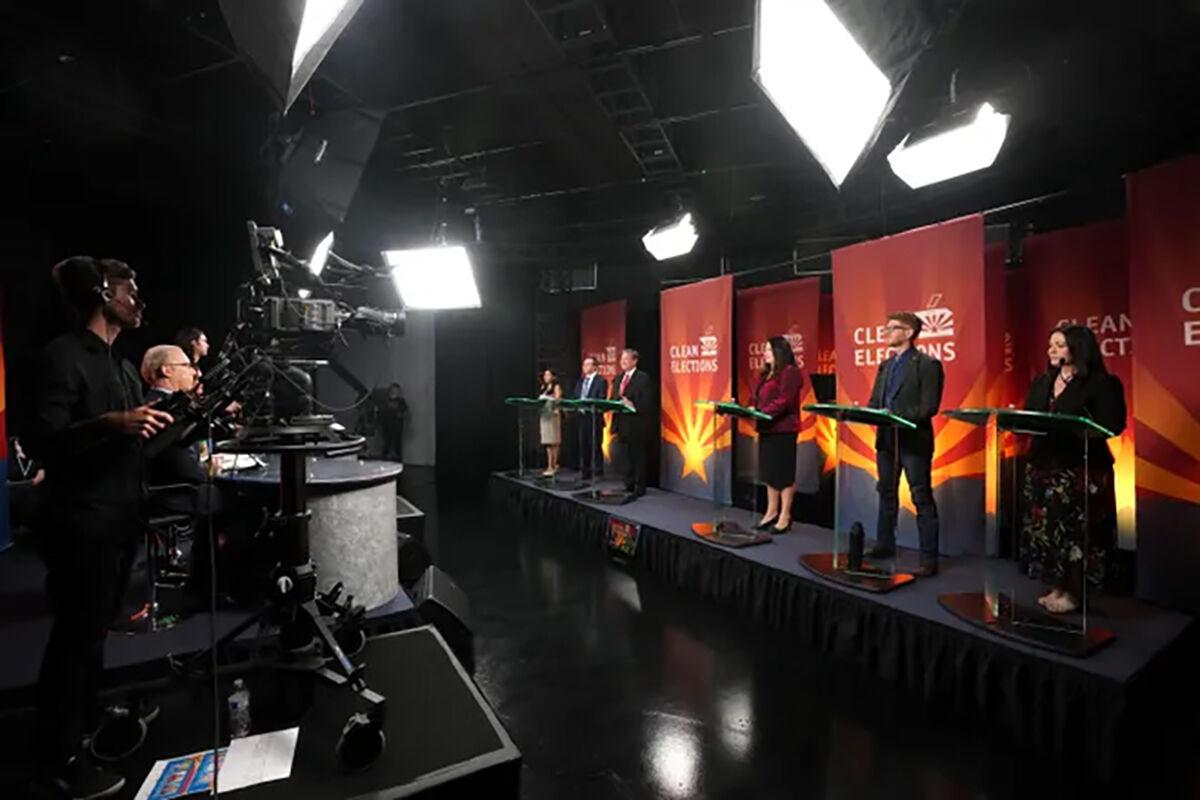The candidates competing for three seats on the Arizona Corporation Commission split down the party line on electricity, specifically the sources used to generate it, during an hourlong debate Tuesday night.
It revealed a stark contrast between the three Democrats − Ylenia Aguilar, Joshua Polacheck and Jonathon Hill − coming out in favor of renewable resources like solar and seeing the regulatory body having a constitutional duty to push utilities in that direction, while the three Republican candidates − Rene Lopez, Rachel Walden and incumbent Lea Márquez Peterson − expressed their interest in a diverse energy portfolio that includes fossil fuels, and allowing energy providers to make the decision on what it’s generated from on their own.
The six candidates at Tuesday night’s debate all received at least 1% of votes during the July 30 primary. Green Party candidates Mike Cease and Nina Luxenberg did not participate, however they will be on the Nov. 5 ballot.
The five-member Arizona Corporation Commission is responsible for regulating utility companies and setting rates and policies for those utilities, like gas, water and electric. It also sets policies for acts such as when utility companies can shut off service for customers who don’t pay, or where such companies can get their power. There is currently a 4-1 Republican majority and each commissioner serves a four-year term.
All six candidates say they would prioritize keeping electric rates affordable while expanding the state’s ability to generate power as its population and business industries grow. But the Democrats on stage Tuesday see this as an opportunity for solar growth, while Republican candidates came out in support of a broad mix of power sources that include solar, wind, natural gas, coal and nuclear.
“What’s the best option for our energy solution? When we have a mixed portfolio. It’s like investing, you don’t put all of your eggs in one basket,” Walden said. “With a mixed portfolio, we can hedge against market conditions... And having that mixed portfolio lets (utility companies) make choices that they can pick whichever source is generating at the cheapest cost at that time.”
Lopez, a former two-term council member for the city of Chandler, said the ACC needs to stay in its “wheelhouse” and not tell utility companies “how to run their businesses.” Doing so, and focusing on oversight but not subsidizing, will ensure that ratepayers only see “duly just” costs, he said.
“Wind and solar can be in the mix, but it shouldn’t be subsidized, just like anything else energy-wise (doesn’t) need to be subsidized,” he said. “We need it all, and that’s the only way we’re going to be be able to keep things affordable for everyone.”
Peterson, the incumbent, said that while Arizona has strong solar production, the diversity of its energy sources is paramount and reliability needs to be the Commission’s “No. 1 factor” as the state’s population continues to grow.
“We see incredible growth in solar and battery... but the reality is, as Arizona continues to grow, whether it’s residential growth or we have this long line of data centers and semiconductor industries that want to come to the state,” she said, “we need to prepare for that energy demand.”
And while the Democrats are not against a diversified energy portfolio, said Aguilar, there’s no reason for the state to not go head-first into solar.
“We are living in Arizona (where) we have 365 days of sunshine. We could benefit from reducing energy, just in our backyards, and with solar, over time, costs would go down,” she said. “When we’re talking about nuclear and other forms of energy, the (building) costs are really expensive ... And guess who that falls back on, those costs, the ratepayers.”
Polacheck was in strong disagreement with the Republicans on stage Tuesday night. He, and Hill, both said Arizona’s large utility companies are seeing record profits, while their customers are paying record rates. He pointed to Nevada, which “opened up their generation market” and saw it “bloom,” going from about 10% energy independence to over 50% “in less than a decade,” he said.
“Right now, it is cheaper to be building a clean energy future in our state, but instead we are providing perverse incentives to the utilities to be building infrastructure that we don’t need and (are) getting in the way of our clean energy future,” he said. “There is a possibility of letting the market go free. And I can’t believe I’m saying this as a Democrat, but the Republicans on this stage are getting in the way of the free market in regards to energy.”
It’s the Corporation Commission’s duty to push utility companies further into clean energy sources, Hill said, although it’s not something the body is concerned with in its present makeup.
“There’s been a lot of talk about the free market. The problem with that is that some companies, these utilities, are monopolies,” he said. “They are not subject to free market forces. You don’t have a choice of who you take your business to, and so it’s a constitutional duty of the Corporation Commission to regulate those utilities and to guide them in a way that is beneficial for all of Arizona.”
Check out some innovative and sometimes overlooked energy-saving strategies that can help you and your wallet survive Tucson's summer swelter.





